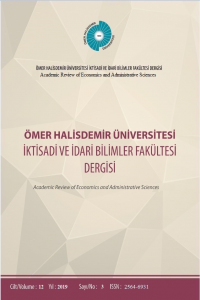The Effects of Equity Sensitivity on Employees Job Satisfactions & Turnover Intentions: A Field Study on Food and Beverage Outlet’s in Bishkek
Abstract
Equity sensitivity is expressed as the degree of
sensitivity of the employees 'input-output ratio to be equal to other employees
in line with Adams's equality theory.. In this study, the relationship between
equity sensitivity, job satisfaction and turnover intention was investigated.
Food and beverage enterprises operating in Bishkek, the capital of Kyrgyzstan,
were selected as a sample. Factor analysis, correlation analysis and regression
analysis were performed. As a result of the analysis, a positive significant
correlation was found between the perception of equity sensitivity and material
job satisfaction. In addition, it was observed that there is a negative
correlation between job satisfaction and turnover intentions of employees.
References
- Adams, J. S. (1966). Inequity In Social Exchange. Advances in Experimental Social Psychology, 2(C), 267–299. https://doi.org/10.1016/S0065-2601(08)60108-2
- Blakely, G. L., Andrews, M. C., & Moorman, R. H. (2005). The Moderating Effects of Equity Sensitivity on the Relationship between Organizational Justice and Organizational Citizenship Behaviors. Journal of Business and Psychology, 20(2), 259–273. https://doi.org/10.1007/sl0869-005-8263-3
- Davison, H. K., & Bing, M. N. (2008). The Multidimensionality of the Equity Sensitivity Construct : Integrating Separate Benevolence and Entitlement Dimensions for Enhanced Construct Measurement. Journal of Managerial Issues, 20(1), 131–150.
- Hancer, M., & George, R. T. (2003). Job Satisfaction Of Restaurant Employees: An Empirical Investigation Using The Minnesota Satisfaction Questionnaire. Journal of Hospitality and Tourism Research, 27(1), 85–100. https://doi.org/10.1177/1096348002238882
- Huseman, R. C., Hatfield, J. D., & Miles, E. W. (1987). A New Perspective on Equity Theory: The Equity Sensitivity Construct. Academy of Management Review, 12(2), 222–234. https://doi.org/10.5465/AMR.1987.4307799
- King, W. C., Miles, E. W., & Day, D. D. (1993). A Test and Refinement of the Equity Sensitivity Construct. Journal of Organizational Behavior, 14(4), 301–317.
- Liu, Y. (2005). Investigating turnover intention among emergency communication specialists. Graduate Theses and Dissertations. Retrieved from http://scholarcommons.usf.edu/etd/744
- Locke, E. A. (1976). The nature and causes of job satisfaction. In M. D. Dunnette (Ed.), Handbook of industrial and organizational psychology. Chicago: Rand McNally.
- Tett, R. P., & Meyer, J. P. (1993). Job Satisfaction, Organizational Commitment, Turnover Intention, And Turnover: Path Analyses Based On Meta‐Analytic Findings. Personnel Psychology, 46(2), 259–293. https://doi.org/10.1111/j.1744-6570.1993.tb00874.x
Eşitlik Hassasiyetinin İşgörenlerin İş Doyumu Ve İşten Ayrılma Eğilimleri Üzerindeki Etkileri: Bişkek Yiyecek İçecek İşletmeleri Üzerine Bir Alan Araştırması
Abstract
Eşitlik
hassasiyeti, Adams'ın eşitlik teorisi doğrultusunda işgörenlerin girdi-çıktı
oranlarının diğerleriyle eşit olması konusundaki duyarlılığın dereceleri olarak
ifade edilmektedir. Araştırmada, eşitlik hassasiyetinin iş doyumu ve işten
ayrılma eğilimi ile ilişkisi incelenmiştir. Örneklem olarak Kırgızistan’ın
başkenti Bişkek’te faaliyet gösteren yiyecek içecek işletmeleri seçilmiştir.
Verilere faktör analizi, korelasyon analizi ve regresyon analizi yapılmıştır.
Analizlerin sonucunda, Eşitlik hassasiyeti algısı” ile “maddi iş doyumu”
arasında pozitif yönde anlamlı bir ilişki tespit edilmiştir. Ayrıca,
işgörenlerin eşitlik hassasiyeti algıları ile işten ayrılma eğilimleri arasında
iş doyumunun aracılık ilişkisi olduğu sonucuna ulaşılmıştır.
References
- Adams, J. S. (1966). Inequity In Social Exchange. Advances in Experimental Social Psychology, 2(C), 267–299. https://doi.org/10.1016/S0065-2601(08)60108-2
- Blakely, G. L., Andrews, M. C., & Moorman, R. H. (2005). The Moderating Effects of Equity Sensitivity on the Relationship between Organizational Justice and Organizational Citizenship Behaviors. Journal of Business and Psychology, 20(2), 259–273. https://doi.org/10.1007/sl0869-005-8263-3
- Davison, H. K., & Bing, M. N. (2008). The Multidimensionality of the Equity Sensitivity Construct : Integrating Separate Benevolence and Entitlement Dimensions for Enhanced Construct Measurement. Journal of Managerial Issues, 20(1), 131–150.
- Hancer, M., & George, R. T. (2003). Job Satisfaction Of Restaurant Employees: An Empirical Investigation Using The Minnesota Satisfaction Questionnaire. Journal of Hospitality and Tourism Research, 27(1), 85–100. https://doi.org/10.1177/1096348002238882
- Huseman, R. C., Hatfield, J. D., & Miles, E. W. (1987). A New Perspective on Equity Theory: The Equity Sensitivity Construct. Academy of Management Review, 12(2), 222–234. https://doi.org/10.5465/AMR.1987.4307799
- King, W. C., Miles, E. W., & Day, D. D. (1993). A Test and Refinement of the Equity Sensitivity Construct. Journal of Organizational Behavior, 14(4), 301–317.
- Liu, Y. (2005). Investigating turnover intention among emergency communication specialists. Graduate Theses and Dissertations. Retrieved from http://scholarcommons.usf.edu/etd/744
- Locke, E. A. (1976). The nature and causes of job satisfaction. In M. D. Dunnette (Ed.), Handbook of industrial and organizational psychology. Chicago: Rand McNally.
- Tett, R. P., & Meyer, J. P. (1993). Job Satisfaction, Organizational Commitment, Turnover Intention, And Turnover: Path Analyses Based On Meta‐Analytic Findings. Personnel Psychology, 46(2), 259–293. https://doi.org/10.1111/j.1744-6570.1993.tb00874.x
Details
| Primary Language | Turkish |
|---|---|
| Journal Section | Articles |
| Authors | |
| Publication Date | October 18, 2019 |
| Submission Date | May 7, 2019 |
| Acceptance Date | September 30, 2019 |
| Published in Issue | Year 2019 Volume: 12 Issue: 4 |
Cite

Ömer Halisdemir Universitesi Iktisadi ve Idari Bilimler Fakültesi Dergisi (OHUIIBF) is licensed under the Creative Commons Attribution-Noncommercial-Pseudonymity License 4.0 international license.


